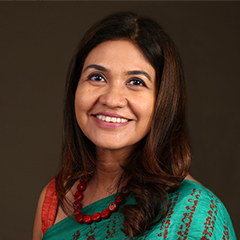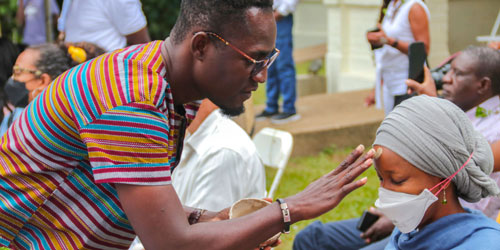EdelGive Foundation Executive Chairperson Vidya Shah and MacArthur President John Palfrey address how they are thinking about grantmaking in a pandemic and beyond. In this conversation they discuss funding with an equity lens, the resilience of grassroots organizations, collaborating with other funders, and giving more, giving sooner, and giving better.
Grassroots Organizations at the Center ›
Planning Now for a Post-COVID Future ›
Collaborations Teach Us Something New ›
Interesting Times for Philanthropy ›
John
I am so grateful for your willingness to engage in this important, urgent conversation. I imagine you have much on your mind these days.
We at MacArthur deeply admire the work you do at EdelGive and look to you as a leading voice in philanthropy in India and across the world. Given this moment we find ourselves in, both in the United States and India, how are you thinking differently about grantmaking in a pandemic?
Vidya
Thank you for writing and getting us to think about grantmaking in possibly the toughest time we have ever faced.
The pandemic has clearly impacted all of us in very significant ways. For some of us, it has meant learning that we need so little, and it has meant cherishing family and friends, working from home, and enjoying clean air and blue skies. But in India, for the vast majority, perhaps as many as 800 million or more people from low-income and marginalized communities, it has brought unimaginable misery and suffering. The first wave in 2020 brought with it a humanitarian crisis—migrants walked for hours every day in the hot April and May sun, bereft of food, income, and livelihood.
The second wave has been far more punishing. This time, the complete breakdown of an already-weak health infrastructure, in communities that have seen dwindled savings and lack of employment for months, has been so punishing that people have begun to lose faith and hope. And unlike the first wave, when our grassroots organizations adapted quickly to address the emergent needs of the communities they serve, to do “what it takes,” the second wave has brought widespread infections and death of frontline workers, and funding challenges, exacerbated by adverse regulations, have left these organizations fatigued and struggling for survival.
At EdelGive, our grassroots organizations are at the center of everything we do. We believe and trust in their ability and judgment in what should be priority focus areas as they are placed within the communities they serve.
In addition to extending emergency funding, our mission is to raise unconditional financial support for our partners. This funding is flexible, our partners may decide end-use based on the emerging situation: provision of ration kits, medicines, nebulizers, cash support, ambulance services, PPE kits; provision of oxygen to patients and assistance in arranging supply for critical patients; awareness generation on vaccinations and entitlements; or collaboration with government administration for coordinating relief work and mental health resource support. Our regular grants program continues unchanged with minimum reporting obligations.
In the medium term, I believe that resilience and capacity building of organizations will have to take precedence for grantmakers. With this belief and particularly in the context of the pandemic, which has tested our partners, EdelGive Foundation has launched The Grassroots Resilience Ownership and Wellness Fund (GROW). A collective of global and Indian philanthropists, GROW will work towards jointly supporting and sustaining 100 grassroots organizations across India, over a period of 24 months.
What is becoming increasingly clear to me, however, is what philanthropy has always known—what we can do will always pale in comparison to government and state ability. In the long term, therefore, we need new thinking and advocacy around health spend in India; health infrastructure—hard and soft; manufacturing capacity of medicines and vaccines and stock-piling policy of essential drugs; to revisit the state/federal architecture of how we respond to large national emergencies and challenges.
In this context, I would love to learn from you, especially since MacArthur is focused on systems change. How does responding in the moment allow you to stay true to your mission of long-term systems change?
John
Thank you for this heartfelt—and heartrending—account of what you face in India today. Thank goodness that you, your family, and your partners are hard at work in the way that you are, in service of the greater good in this time of astounding need.
I appreciate your question about what MacArthur is doing in the moment while remaining true to our vision of long-term systems change. In the past year, we have made grant awards that we would not typically make as a Foundation devoted to systems change. We have supported initiatives in our own communities to provide the basics: food, shelter, and healthcare. We believe these needs should be human rights that everyone should enjoy in good times and in times of crisis.
In this crisis, we have decided to borrow money to spend more than we typically do so that, with many others, we could link arms in meeting immediate needs and planning now for a brighter post-COVID future. As you have put it beautifully though, the state needs ultimately to be the backstop for such needs. Our funds, while ample, are far too few to meet the scale of this type of need over time.
Where we continue to focus is in the medium- to long-term. This pandemic has led us to refine our focus on racial and ethnic equity across all our work and in each of our communities. While that looks different in India than it does in Nigeria and different again the United States, the vision of a more equitable and inclusive world is consistent across all the places and fields in which we work and live. We are investing in people, organizations, and networks that can bring about this more equitable and inclusive future, learning from what we’ve experienced and building new partnerships to meet the complex challenges we all face.
One of the things that has been most gratifying about our work with you, Vidya, has been the powerful spirit of collaboration you bring to everything you do. You have mentioned the different ways you are interacting with your grantee partners. I would be fascinated to hear about how you at EdelGive might be thinking differently about collaboration with other funders, whether in the climate work, on which we partner with you, or otherwise based on the experience of this past year?
Vidya
It is clear MacArthur has made its communities the centerpiece of its vision for a more equitable and inclusive world. This I think, allows for a large, highly reputed organization like yours to use a bifocal (or perhaps a trifocal) lens between short-, medium- and long-term objectives and to adapt very quickly to emergencies.
On your question of collaboration, we have rued the lack of collaboration in the sector for far too long. However, in our rather short 13 years of operation, we are beginning to see a definite shift in attitudes to working together—perhaps this will be one of the rare gifts of this crisis. I am glad that foundations are talking to each other more often; there is a clear, heightened desire to learn and share.
And most interestingly, we have seen three new collaborations take birth over the last 12 months—the Pay-What-It-Takes initiative, a multi-year initiative led by The Bridgespan Group and six anchor partners including EdelGive, working towards awareness building for and strategic guidance of non-governmental organizations (NGOs).
The Migrants Resilience Collaborative (MRC) is an initiative of our NGO partner Jan Sahas; perhaps a first-of-a-kind grassroots-led, multi-stakeholder collaborative of nonprofit, philanthropic, and private sector actors. Its mission is to ensure safe and responsible recovery of migrant families and their livelihoods post-COVID. MRC will support 10 million workers and their families in 100 districts and cities over the next five years. We are MRC’s strategic partner; I also serve on its steering committee.
And finally, we have The GROW Fund by EdelGive to build, support, and sustain 100 grassroots organizations across India over two years by funding capability building needs, core costs, and functions for future-readiness.
Vidya
So, with these three new collaborations, we are now part of six. The fascinating aspect of our experience of working with diverse partners—government, funders, NGOs, resource organizations—has been that each collaboration has taught us something new, helping us improve the design and mechanics of collaborations to follow.
So, while our first collaborative, Collaborators for Transforming Education, helped set the bar on structure, governance, reporting, communication, and annual planning, our next, Coalition for Women Empowerment, helped build cohesion, cross-learning, and advocacy for 15 NGOs across 14 states in India working in the space of gender equity. And the India Climate Collaborative, where you are a key partner as well, has helped us understand data and research-based, multi-stakeholder engagement to build urgency and momentum for climate change.
Collaboration is an intrinsic part of our theory of philanthropy. We have always been an open platform; we want to learn as much we want to share. But collaborations work when we invest time, thinking, and resources in designing for success through processes for communication, planning, and co-opting NGOs and funders as partners, not mere implementers of the collaborative’s vision.
Speaking of the India Climate Collaborative, I am curious to know where your work on climate change stands right now. How are you thinking about it with an equity lens?
John
This progress on collaboration is so heartening.
As you know, our investment in addressing climate change is the largest of our four Big Bets as a Foundation. The principal effort is to work with you and many other partners around the globe to help keep the rise in temperature to well below 2 degrees above pre-industrial levels.
At the same time, equity is central to our climate work. We know that the least wealthy members of the global community are already feeling some of the harshest effects of climate change. And we know that any solutions to the climate crisis must be developed with, and not just for, people who have been and are marginalized. We can make a big difference on climate equity through our grantmaking and the way in which we partner.
John
Vidya, this has been a wonderful conversation. Thank you for making the time to engage with me. We greatly value our close collaboration with your team and family.
Could you please bring us to a close with some thoughts about what you see on the horizon for EdelGive?
Vidya
In India, I think we are poised for some interesting times for philanthropy. On the one hand, we have an explosion in entrepreneurship and consequently younger, first-generation wealth. In fact, private philanthropy is growing significantly faster than corporate philanthropy. This means that these new philanthropists may want to give more, give sooner, and give better, as we have seen in the United States, in particular. Some conversations that I have had with them indicate their keen desire to contribute to development in India at a large scale and a willingness to back new ideas and platform thinking.
This “refresh” is very comforting: I think an already vibrant, highly innovative, though chaotic, Indian philanthropy market will hopefully see a new spring of thought and support to the most pressing issues today—climate change, systems thinking, governance and justice, and state capacity building.
Thank you for initiating this conversation and look forward to growing and strengthening our partnership.





